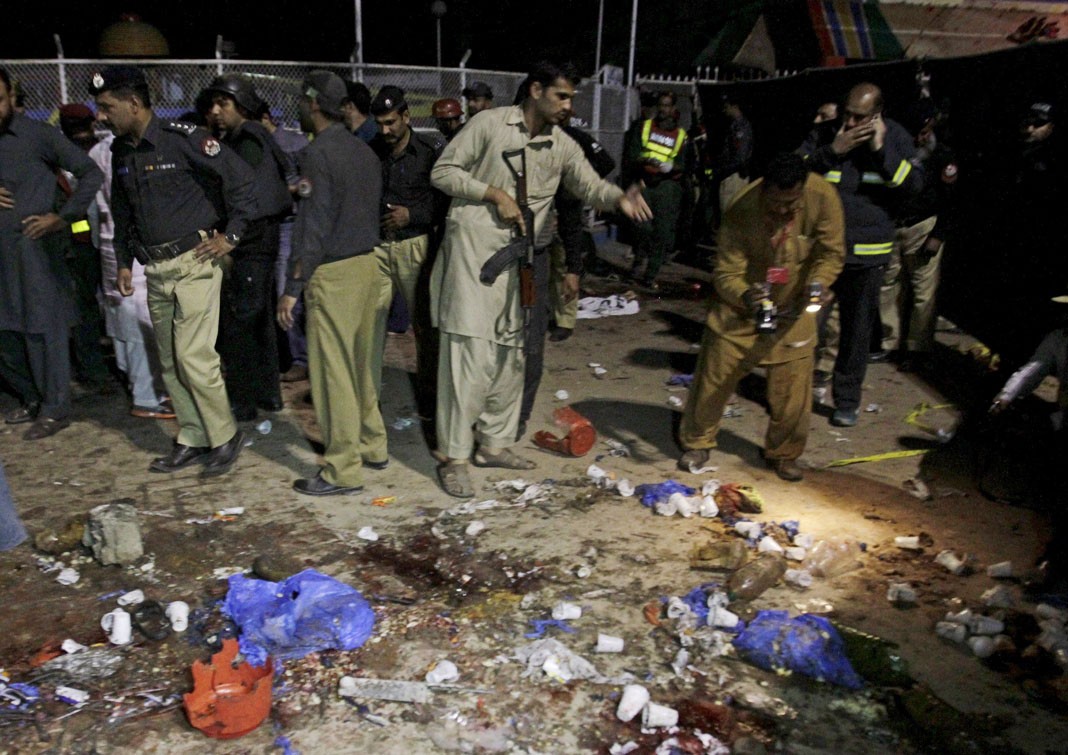
In the aftermath of the March 27 attack in Lahore, we must change the way we think and act

The Lahore carnage of March 27, 2016 has shaken the city’s calm and the administration’s conscience. But this is not the first episode of its kind. Most visible instances include the terror attacks on the Jinnah International Airports old terminal in Karachi, the Army Public School in Peshawar, the cafeteria of International Islamic University, police officer Chaudhry Aslam and many more.
After the Karachi airport attack, the establishment and provincial administration swung into action and initiated the Karachi operation. It is believed that similar operation will begin in Lahore and other parts of Punjab.
But several core issues must be reviewed to predict the effectiveness of such responses to terror attacks in cities and its hinterland.
From common observation, media reports and research studies, it is well known that all major political and interest groups condemn terrorism. However, there is little agreement on the roots, spread and impacts of terrorism. Unless a consensus is developed on these, all efforts to counter them will be futile.
No terror network can succeed in its nefarious designs without mobilising the financial means. Intelligence sleuths and banking experts may be engaged to prepare a counter strategy for blocking dubious transactions. It may be understood that this is an extremely demanding task. Expanded cash economy in Fata, clan protections to terror supporters, invisible and coded nature of transactions, international and local patronages and many similar factors can prove as the starting hurdle.
Local knowledge about all kinds of money transactions can be relied on. Remittances through the illegal channels such as ‘hundi’, ‘parchi’ and ‘havala’ are obvious cases in point. The crime investigation experts may be invited to focus on the various unresolved dimensions of acquisition, transactions and distributions of funds across terror enterprises. Needless to say those tough decisions shall have to be taken while rounding up the well-connected barons and their peers. Some hard choices will have to be made for national interest.
Our urban contexts have several types of vulnerabilities, which become extended liabilities in the process of combat against terrorism. Irregular settlements and unorganised urban growths and developments are the foremost concerns. Most of our inner city areas have congested narrow lanes with very limited access for any kind of relief work. Shoddy construction, convoluted electric wiring and haphazard infrastructure constitute a perpetual hazard. The society is polarised across ethnic, communal and social lines. For instance, in Rawalpindi and Islamabad, the administration appears to be helpless to initiate any law enforcement operation against the dubious Lal Masjid clerics, due to fear of riots and rebuttals.
On March 27, 2016 the dharna and protest rallies in Rawalpindi-Islamabad by a section of religious activists, paralysed lives of the residents. The leadership of law enforcement agencies has also expressed concerns about the inadequate numbers of personnel especially those deployed for anti-terror duties. Some sections of conservative religious groups have been found fomenting unrest and hysteria among masses for revoking anti-terror plan in the real sense of the world. The inability of lower judiciary to effectively adjudicate terror-related cases is another shortcoming. A concerted action is needed to address each of these vulnerabilities for a wholesome output.
At the operational side, experts have generally cited that terror attacks can best be dealt through pre-emption. Once a terrorist is set in motion, death and destruction follow. The rational way is to strengthen the process of locating hideouts and accomplices through surgical and precise operations to avert mass destruction.
Disappointingly, one finds that orthodox means of blockading the thoroughfares and manual searches are made to deal with the scenario. Recourse should be made towards appropriate technology of mapping, monitoring and targeting concurrent actions. The support of relevant tools of information technology may be acquired.
On the basis of available information and database, a broad-based crime information system can be electronically produced and shared among the concerned stakeholders. Inputs from media correspondents, academia, technologists, IT professionals and law enforcement agencies can also be mobilised.
A workable model of such work exists in the form of Citizen Police Liaison Committee (CPLC), where technology and collaborative effort of the citizens has borne fruit.
For anti-terror exercises, a similar concept may be floated for obtaining feedback and consultation. The ordinary citizens feel comfortable to link up to institutions like CPLC. It may prove useful to generate a government facilitated multi-stakeholder forum to prevent terror.
A core issue is to respond to the emerging needs and compounding trauma of terror-affected people, especially the economically downtrodden groups. In many cases, the injured constitute a sizable portion of the affected target groups that require continuous assistance in rehabilitation. Many people who are faced with lifelong disabilities as a consequence of attacks lose hope and develop frustrations.
Ordinary and specialised healthcare is the foremost necessity in these situations. Public sector healthcare facilities have performed exceptionally well in minimising the agonies and trauma of such heinous acts, their meagre resources and capacities notwithstanding.
Monetary and insurance incentives must be extended to those medical practitioners and paramedical staff who have served under most adverse circumstances. Certain units and fields of specialisation must be bolstered, such as burns units and trauma care.
The public healthcare institutions must be bolstered to develop and equip such facilities on an emergency basis. A district-wise strategy must be worked out to consolidate the district headquarter hospitals in terror affected areas. Charsadda, Mardan, Nowshehra, Dera Ismail Khan and other districts in KPK can be considered for immediate action.